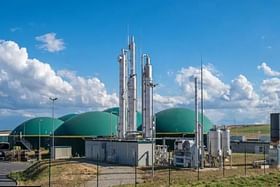The speedy expansion of compressed biogas (CBG) will help India in meeting its additional energy requirements from domestic sources, Union Minister for Petroleum Hardeep Singh Puri.
While addressing the Global CBG Conference of the Indian Federation of Green Energy (IFGE) — CBG Producers Forum, Puri said said on Monday, “The government has an ambitious target to set up 5,000 commercial (CBG) plants by 2024-25 and produce 15 million metric tonnes of CBG, which will replace other gases which are being used in the country”.
CBG
CBG — a biofuel — is produced from biomass sources like agriculture residue, cattle dung, sugarcane press mud, municipal solid waste, sewage treatment plant waste, etc.
The biogas is purified to remove impurities such as hydrogen sulfide, carbon dioxide, water vapour and compressed as CBG, which has more than 90 per cent methane content.
Further, CBG is exactly similar to the commercially available natural gas in its composition and energy potential. With similar calorific value and other properties similar to CNG, compressed biogas can be used as an alternative, renewable automotive fuel. Given the abundance of biomass in the country, CBG has the potential to replace CNG in automotive, industrial and commercial uses in the coming years.
This explains why the government has been prioritising development of CBG plants in the country as it would reduce its dependence on imports of natural gas.
Puri said that the government of India has set a target to increase the share of gas in the energy mix up to 15 per cent in 2030 to make India a gas-based economy.
“Presently we are importing around 50 per cent of our requirement of natural gas. The speedy expansion of CBG will help in meeting our additional requirement from domestic resources,” the Union Minister said.
SATAT
As part of initiative under the National Biofuel Policy, 2018, Ministry of Petroleum and Natural Gas launched the Sustainable Alternative Towards Affordable Transportation (SATAT) initiative in October, 2018 for promoting use of CBG in the CNG (transport) and PNG (domestic) sector of city gas distribution (CGD) supplies of natural gas.
SATAT has envisaged setting up 5,000 CBG plants with total CBG production capacity of 15 million metric tonne per annum (MMTPA) ie, equivalent to 54 MMSCMD of gas by 2024-25.
Under the initiative, oil and gas marketing companies (OGMCs) viz, Indian Oil, HPCL, BPCL, GAIL and IGL have been inviting expression of interest (EoI) from potential investors/entrepreneurs to procure CBG for further selling to automotive and commercial customers. Oil and gas companies are signing commercial agreements for 15 years for procurement of CBG, to be further extended mutually.
So far 46 CBG plants have been commissioned and sale has been started from more than 100 retail outlets. Also, around 40 plants are expected to be commissioned by April 2023.
Further Union budget 2023 has given a huge boost to bio-CNG with a special attention on setting up CBG projects under the umbrella of GOBARdhan (Galvanising Organic Bio-Agro Resources Dhan) scheme.
Finance Minister Nirmala Sitharaman, presenting Union Budget 2023-24 in Parliament, had earmarked Rs 10,000 crore towards setting up of 200 CBG plants and 300 community and cluster-based biogas plants.


